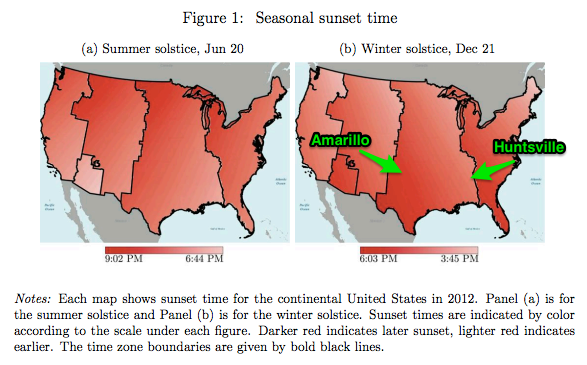
Why Bubble Wrap is Disappearing
July 27, 2015
Paying More at the Gas Pump
July 29, 2015Our story starts with a tale of two cities.
Located at opposite ends of the U.S. Central Time Zone, the people in Amarillo, Texas and Huntsville, Alabama see the sun setting at different times. Because 864 miles separate them, the sun could set at 8:00 in Huntsville and close to 9:00 in Amarillo. Consequently, shown by the American Time Use Survey, people go to bed later in Amarillo.
Where are we going? To the connection between sleep and wages.
Earning More When You Sleep More
Because our bodies respond more to the sun than the clock, the people in Amarillo tend to go to bed later than a typical Huntsville resident.

From: “Time Use and Productivity: The Wage Returns to Sleep”
But the next morning, everyone arises at approximately the same time to go to work. Since Amarillo’s population went to bed later. it is more likely that they were tired during the day. Being tired can make a difference at work. Studies have shown that tired doctors make more mistakes and tired students fare worse on tests.
Correspondingly, the authors of a sleep and wages study hypothesize that more sleep leads to greater productivity. Specifically, their data indicate that when workers experience an hour a week more sleep in the short run, their wages increase an average of 1.5 percent while in the long run they are up by 4.9 percent. Amazingly, an hour more a night could even mean a wage spike of 16 percent.
Earning Less When You Sleep More
However, as typical economists saying “On the one hand…but on the other,” we can find a rather different conclusion. With a co-author, economist Dan Hamermesh concluded that high income workers choose to sleep less in order to earn more. Explaining their results, one headline said, “Sleep, Why Bother? It Costs Too Much.” There is though one qualification. High income workers will sleep less but only to the point that it starts to hurt their productivity.
Our Bottom Line: Personal Income
So as always we have tradeoffs. Here though, the considerations are multiple. We decide between sleep and productivity and also sleep and work time. (And I am sure we could add lots of other choices if we continued.).
However, whether looking at productivity or time allocation, both affect our personal income.
![econlifelogotrademarkedwebsitelogo[1]](/wp-content/uploads/2024/05/econlifelogotrademarkedwebsitelogo1.png#100878)





2 Comments
Anecdotally, I know a lot of successful people who get very little sleep. One of the most powerful and successful people in PA, both in government (not an elected official) and in commerce is famous for sleeping no more than 3 hours/night. He’s rare and fortunate in being able to perform maximally with little sleep.
I still wonder if so little sleep is physiologically feasible.